

Friedman on racial discrimination. It is interesting to re-read Milton Friedman's Capitalism and Freedom some fifty years after its original publication.
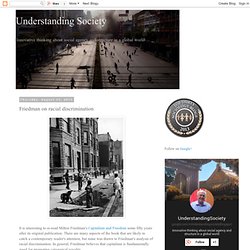
There are many aspects of the book that are likely to catch a contemporary reader's attention, but mine was drawn to Friedman's analysis of racial discrimination. In general, Friedman believes that capitalism is fundamentally good for promoting categorical equality. It is a striking historical fact that the development of capitalism has been accompanied by a major reduction in the extent to which particular religious, racial, or social groups have operated under special handicaps in respect of their economic activities; have, as the saying goes, been discriminated against. (108) More specifically, Friedman argues that racial discrimination in employment (and housing as well, it would seem) is essentially impossible within a market economy. We have already seen how a free market separates economic efficiency from irrelevant characteristics. (Is anti-racism just a "taste"?)
Building Chicago Economics. Friedman and Hayek. Capitalism and Freedom - Milton Friedman, Rose D. Friedman. Milton Friedman: a brief appreciation. Home > Economics - General > Milton Friedman: a brief appreciation Milton Friedman has died at the age of 94.
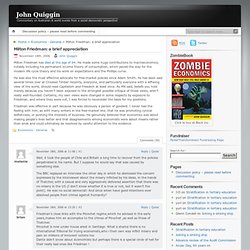
He made some huge contributions to macroeconomics, notably including his permanent income theory of consumption, which paved the way for the modern life cycle theory and his work on expectations and the Phillips curve. He was also the most effective advocate for free-market policies since Adam Smith. As has been said several times over at Crooked Timber recently, everyone, and particularly everyone with a leftwing view of the world, should read Capitalism and Freedom at least once. As Mill said, beliefs you hold merely because you haven’t been exposed to the strongest possible critique of those views, aren’t really well-founded. Friedman was effective in part because he was obviously a person of goodwill. Comments are closed. Milton Friedman’s Distortions. Milton Friedman is quite a revered figure – among economists, conservatives, libertarians and some leftists – partly, of course, because he was a prolific economist, but also in large part due to his debating skills.
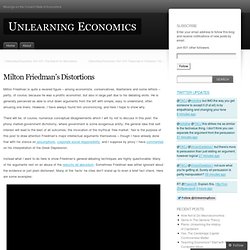
He is generally perceived as able to shut down arguments from the left with simple, easy to understand, often amusing one liners. However, I have always found him unconvincing, and here I hope to show why. There will be, of course, numerous conceptual disagreements which I will try not to discuss in this post: the phony market-government dichotomy, where government is some exogenous entity; the general idea that self interest will lead to the best of all outcomes; the invocation of the mythical ‘free market.’
Instead what I want to do here is show Friedman’s general debating techniques are highly questionable. Many of his arguments rest on an abuse of the reductio ad absurdum. Milton Friedman’s Magical Thinking - Dani Rodrik. Exit from comment view mode.
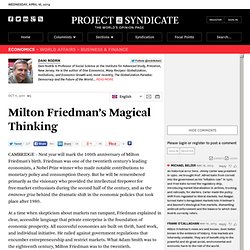
Click to hide this space CAMBRIDGE – Next year will mark the 100th anniversary of Milton Friedman’s birth. Hayek, Friedman, And The Illusions Of Conservative Economics. The Great Persuasion: Reinventing Free Markets since the DepressionBy Angus Burgin (Harvard University Press, 303 pp., $29.95) JUST AS I WAS wondering how to start this review, along came the Sunday New York Times Magazinewith a short article by Adam Davidson with the title “Made in Austria: Will Friedrich von Hayek be the Tea Party’s Karl Marx?”

One Tea Party activist reported that his group’s goal is to fill Congress with Hayekians. This project is unlikely to go smoothly if the price of admission includes an extensive reading of Hayek’s writings. As Davidson remarks, some of Hayek’s ideas would not go down well at all with the American far right: among them is a willingness to entertain a national health care program, and even a state-provided basic income for the poor.
The source of confusion here is that there was a Good Hayek and a Bad Hayek. But the Good Hayek also knew that unrestricted laissez-faire is unworkable. The Bad Hayek emerged when he aimed to convert a wider public. Masters of the Universe: Hayek, Friedman, and the Birth of Neoliberal Politics - 01 - 2013. Department of Economics public discussion Date: Wednesday 16 January 2013 Time: 6.30-8pm Venue: Old Theatre, Old Building Speaker: Dr Daniel Stedman Jones Respondents: Professor Mark Pennington, Professor Lord Skidelsky Chair: Professor Stuart Corbridge How did American and British policymakers become so enamoured with free markets, deregulation, and limited government?
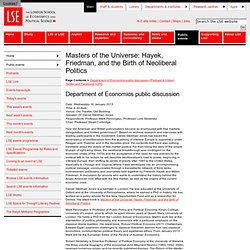
Based on archival research and interviews with leading participants in the movement, Daniel Stedman Jones has traced the ascendancy of neoliberalism from the academy of interwar Europe to supremacy under Reagan and Thatcher and in the decades since. He contends that there was nothing inevitable about the victory of free-market politics. Far from being the story of the simple triumph of right-wing ideas, the neoliberal breakthrough was contingent on the economic crises of the 1970s and the acceptance of the need for new policies by the political left.